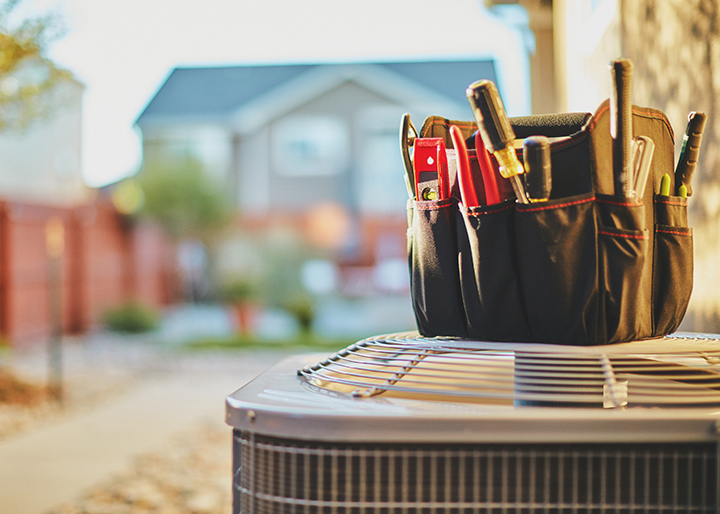A/C Maintenance 101

Maximize Your SFR Investment and Renter Satisfaction
By Doug Ellis
A/C maintenance is key to lowering energy bills and preventing expensive repairs. These items should be addressed as part of an A/C preventive maintenance visit.
Summers can be tough on your air conditioning system. If you missed an early season A/C maintenance check on your single-family rental (SFR) properties, do not put it off any longer as fall and winter can be an excellent time to catch-up on maintenance projects. Waiting longer or skipping regular maintenance can potentially cost you expensive repairs and even the premature replacement of your A/C units. And preventive maintenance for A/C systems is essential to ensure their optimal performance, energy efficiency, and longevity. Regular maintenance can also help prevent costly (and emergency) repairs and improve indoor air quality.
According to Modernize, the average HVAC replacement cost ranges from $6,465 to $11,877 and can cost much more for emergency services. In fact, HomeGuide reported HVAC emergency services typically cost double or triple the regular rate for a service call.
A/C Preventive Maintenance Frequency
If HVAC systems are well maintained, you can expect an estimated life expectancy of 15 to 20 years in most parts of the country; in hotter climates, it is closer to 12 to 15 years. According to the Indoor Air Quality Association, regular HVAC maintenance reduces the risk of costly breakdowns by as much as 95%.
How often should you be scheduling HVAC preventive maintenance for your rentals? An optimal maintenance program includes:
» Two major checkups //typically in the spring and fall—where all systems (including refrigerant levels) are checked, coils are washed and filters are changed.
» Two minor checkups //typically in the summer and winter—where a visual inspection of the system is conducted and filters are changed.
Start by getting your A/C units checked, and then get them on a regular preventative maintenance schedule. Here is what an HVAC technician should be checking and addressing as part of an A/C preventive maintenance checklist:
Air filters
Regularly replacing air filters (as part of your planned A/C maintenance and then monthly) can potentially help you avoid problems with your HVAC unit.
Plus, by routinely changing air filters, your renters can save on their energy bills. In fact, the U.S. Department of Energy estimates that replacing those dirty filters can result in a 5% to 15% reduction in energy consumption. While they stand to benefit, it is generally best to not rely on your renters to tackle this task, though. Talk to your property services partner about scheduling this routine job.
Refrigerant system
The refrigerant system is a critical component of A/C maintenance, moving the heat from indoor air to outside. Too much (or not enough) refrigerant decreases a system’s efficiency, drives up costs and can shorten its life. Inspecting and charging refrigerant levels are important for keeping A/C systems in working order. Refrigerant leaks can harm the environment as well, so it is important to address any issues promptly.
Outdoor condenser coil
Because the outdoor coils are naturally exposed to dirt, pollen and other potentially damaging elements due to their outdoor location, they need to be cleaned at least once a year. An HVAC technician will check and record the refrigerant pressure, then rinse the coils with water, applying a cleaning agent and removing any debris that has accumulated around them.
Foliage check
While they work great aesthetically as a disguise, shrubs and plants around outdoor A/C units should stay trimmed back—at least 18 inches on all sides of the unit—to permit air flow. Your property services partner should report back to you if landscaping near the unit is a concern.
Indoor evaporator coil
Indoor coils should be cleaned and inspected for damage every year, especially in advance of the summer months when air conditioners will be doing the most work.
Condensing system
When an air conditioning system pulls heat and moisture from the air, that condensate must be drained outside. The condensing system should be flushed during an A/C maintenance check to prevent or remove any clogs and allow for proper drainage.
Electrical components
During this A/C maintenance visit, the tech will confirm that all electrical components are firmly connected and tighten them if needed. In addition, they should test all motors, contactors and capacitors and recommend replacing any that are underperforming. This step can help you avoid bigger and more expensive repairs.
Ductwork
The A/C maintenance visit should also include a test for air leaks, paying close attention to any gaps or loose ductwork and sealing them as leaks or blockages can reduce efficiency and cause uneven cooling. Cleaning the ducts can also keep pollutants like dust and mold from being circulated inside the home, a benefit your renters will appreciate.
Additional items
During regular inspections, other items that should be addressed include inspecting and tightening electrical components, lubricating moving parts, checking insulation, testing capacitors and relays, and inspecting thermostats and controls.
Remember, while you can perform some tasks yourself, it is crucial to have a professional HVAC technician perform a thorough inspection and maintenance annually to keep your A/C system in optimal condition.
Plan your A/C maintenance check today
Keeping up with routine A/C maintenance can help you maximize your SFR investment by potentially avoiding expensive repairs and even the premature replacement of your unit. Plus, your renters may be able to enjoy the benefits of lower energy bills and improved indoor air quality, contributing to overall renter satisfaction.
Property service companies like MCS can help SFR owners and operators build and manage an effective A/C maintenance program.














